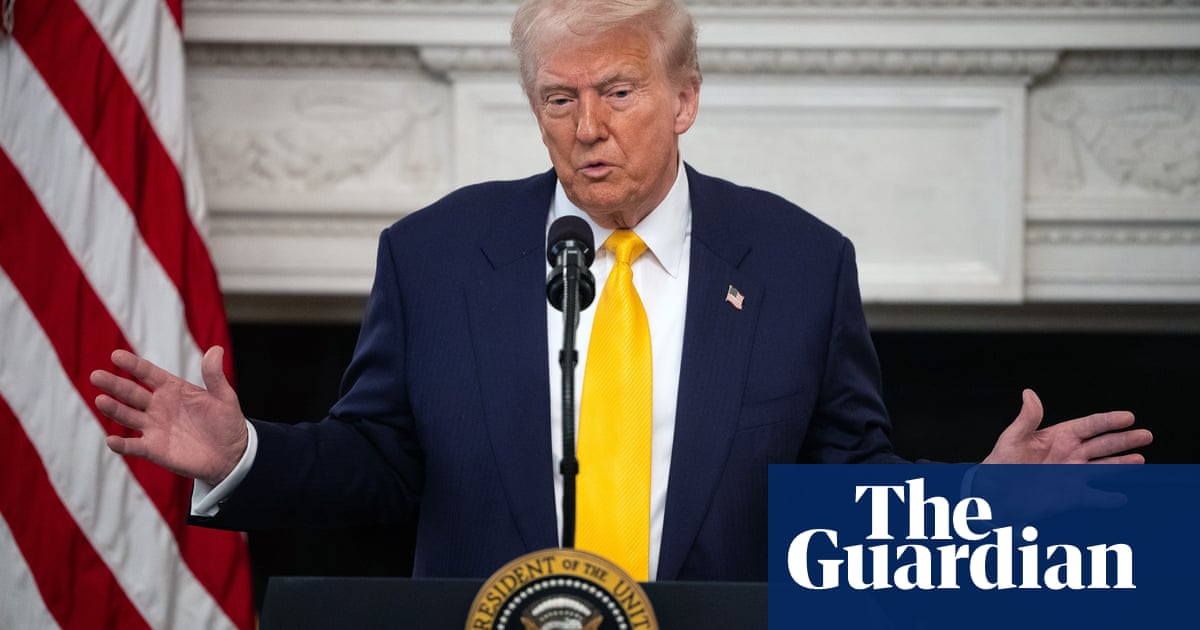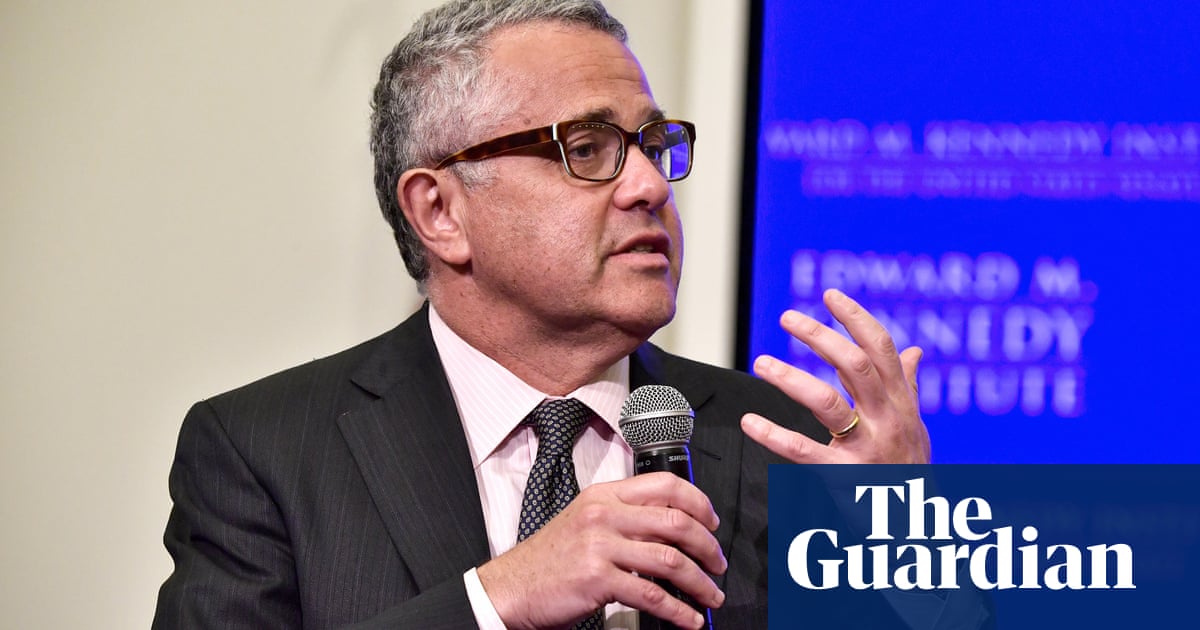Dow futures hit record high as Wall Street welcomes choice of Bessent as Treasury secretary
Wall Street is set to hit a new alltime high when trading begins later today, following the news that Donald Trump has chosen billionaire hedge fund manager Scott Bessent to be the next US Treasury seccretary.
Bessent is seen as a more market-friendly choice than others on the shortlist, who could dilute some of Trump’s more extreme policies and could take a more gradual approach to the introduction of new tariffs.
This has lifted the futures contract on the Dow Jones Industrial Average to a record high this morning, indicating that the Dow could hit a record high when trading begins at 9.30am in New York (2.30pm GMT).
Bessent’s selection for the Treasury Secretary role – which has huge influence over US economy and financial markets – followed a battle with another top contender, billionaire investor Howard Lutnick.
Lutnick, who is the chief executive of financial firm Cantor Fitzgerald, has been handed the role of commerce secretary.
Elon Musk offered his backing to Lutnick for the Treasury berth last week, claiming that Bessent was a “business-as-usual choice, whereas Howard Lutnick will actually enact change.”
The financial markets seem to approve of Trump’s choice though.
US government bond prices are rallying today, pushing down the yield, or interest rate, on the debt.
And the dollar has weakened slightly, having hit a six-month high against the pound last week and a two-year high against the euro.
Both bond yields and the dollar had risen in recent weeks, on concerns that a trade war would lift US inflation, leading to higher interest rates.
Gilles Moëc, group chief economist at AXA Investment Managers, says:
The appointment of Scott Bessent – generally seen as a pragmatist – at the Treasury, after the more radical Howard Lutnick at the Department of Commerce, suggests that Donald Trump may not have made a firm decision on how far he wants to dial up the pressure on tariffs.
As many US economists – including mainstream ones – his main bone of contention with Europe is the lack of demand there, which restricts the capacity to build up a mutually beneficial trade relationship. Developing a proper growth strategy in the EU would not necessarily protect Europe fully from the US protectionist temptations, but it could be a more fruitful strategy, down the line, than merely engaging in retaliatory action, even if it is carefully targeted.
The Strategy Team at investment bank Saxo told clients this morning:
Bessent is known as a fiscal hawk who has advised Trump to create a “3-3-3” policy, including cutting the budget deficit by 3% of GDP by 2028, pushing GDP growth to 3% via deregulation and pumping extra 3 million barrels of oil each day. He is also expressed that tariffs should be used more as a negotiating tool and implemented more gradually.
Key events Show key events only Please turn on JavaScript to use this feature
BoE's Dhingra: Trump tariffs could be deflationary

Richard Partington
Donald Trump imposing massive tariffs on China could drive down global goods price, leading to lower inflation elsewhere around the world including in Britain, a senior Bank of England policymaker has said.
Swati Dhingra, an external member of the Bank’s rate-setting monetary policy committee, said a second Trump presidency imposing a 60% tariff on Chinese goods sold in the US could lead Chinese exporters to cut their prices to ensure they maintained current trade volumes.
Dhingra said:
“It takes a massive amount of demand out of the world market. The way exporters, say in China, would respond to that would be to respond with prices, world prices, as they don’t want to lose market share.”
Speaking at a conference in London on Monday, she said there was uncertainty about what policy the president-elect would carry through from his campaign. Trump had warned before the election earlier this month that he would slap tariffs of up to 60% on Chinese goods and up to 20% on other US trade partners.
A leading expert in global trade, Dhingra said a tariff of up to 60% would have a disinflationary impact for the world economy.
“If there is the kind of big 60% type of tariff increase that’s been proposed, that will have repercussions on to world price and mostly on the downward direction,” she said.
However, if there was a broader “tit-for-tat” trade war where other countries imposed retaliatory tariffs on the US “then we’re in a completely different situation”.
Drawing a comparison with Brexit, Dhingra said Britain leaving the EU had “permanently” raised the price of products in the UK for households. This had a short-term inflation impact, but this had faded as prices stabilised at a higher plateau.
She explained:
“We saw much higher price increases in the UK compared to everywhere else and those pressures have now come off much more quickly as well for the reason they’re not inflationary, they change the price levels, permanently.”
Friday night’s choice of Scott Bessent to be US Treasury Secretary has changed the mood in the markets today, reports Kit Juckes, chief FX strategist at French bank Société Générale.
Juckes reports:
The nomination of Scott Bessent to be US Treasury Secretary has been a catalyst for lower bond yields, higher equity indices and a weaker dollar this morning.
Bessent, the CIO of Soros Fund Management before he set up his own firm in 2015, is perceived to be in favour of pro-growth and deficit-reduction policies, and his nomination was greeted positively by markets worried about the size of the US budget deficit and the inflationary impact of tariffs.
Whether he can help get the US to 3% GDP growth and a 3% budget deficit time will tell, but for now, he has changed the market mood, if nothing else.
Dow futures hit record high as Wall Street welcomes choice of Bessent as Treasury secretary
Wall Street is set to hit a new alltime high when trading begins later today, following the news that Donald Trump has chosen billionaire hedge fund manager Scott Bessent to be the next US Treasury seccretary.
Bessent is seen as a more market-friendly choice than others on the shortlist, who could dilute some of Trump’s more extreme policies and could take a more gradual approach to the introduction of new tariffs.
This has lifted the futures contract on the Dow Jones Industrial Average to a record high this morning, indicating that the Dow could hit a record high when trading begins at 9.30am in New York (2.30pm GMT).
Bessent’s selection for the Treasury Secretary role – which has huge influence over US economy and financial markets – followed a battle with another top contender, billionaire investor Howard Lutnick.
Lutnick, who is the chief executive of financial firm Cantor Fitzgerald, has been handed the role of commerce secretary.
Elon Musk offered his backing to Lutnick for the Treasury berth last week, claiming that Bessent was a “business-as-usual choice, whereas Howard Lutnick will actually enact change.”
The financial markets seem to approve of Trump’s choice though.
US government bond prices are rallying today, pushing down the yield, or interest rate, on the debt.
And the dollar has weakened slightly, having hit a six-month high against the pound last week and a two-year high against the euro.
Both bond yields and the dollar had risen in recent weeks, on concerns that a trade war would lift US inflation, leading to higher interest rates.
Gilles Moëc, group chief economist at AXA Investment Managers, says:
The appointment of Scott Bessent – generally seen as a pragmatist – at the Treasury, after the more radical Howard Lutnick at the Department of Commerce, suggests that Donald Trump may not have made a firm decision on how far he wants to dial up the pressure on tariffs.
As many US economists – including mainstream ones – his main bone of contention with Europe is the lack of demand there, which restricts the capacity to build up a mutually beneficial trade relationship. Developing a proper growth strategy in the EU would not necessarily protect Europe fully from the US protectionist temptations, but it could be a more fruitful strategy, down the line, than merely engaging in retaliatory action, even if it is carefully targeted.
The Strategy Team at investment bank Saxo told clients this morning:
Bessent is known as a fiscal hawk who has advised Trump to create a “3-3-3” policy, including cutting the budget deficit by 3% of GDP by 2028, pushing GDP growth to 3% via deregulation and pumping extra 3 million barrels of oil each day. He is also expressed that tariffs should be used more as a negotiating tool and implemented more gradually.
Microsoft 365 outages reported
Newsflash: Microsoft users are reporting problems using the software giant’s suite of business applications.
According to the Downdetector website, there has been a surge in the number of people reporting problems with Microsoft 365, which includes Outlook.com, OneDrive, Microsoft Teams, and online versions of Office applications such as Word, Excel and Outlook.
Reports peaked just before 10am UK time.

Microsoft’s service status page is currently reporting that “Everything is up and running.”
But independent community website Windows Forum reports that there has indeed been disruption.
In a whirlwind of frustration and confusion, Microsoft 365 services have hit a significant snag, disrupting the workdays of countless office workers. From the early hours of the morning on November 25, reports began flooding in, particularly focused on Outlook, which has become the go-to email client for many companies.
As the sun rose, so did complaints on platforms like Downdetector, painting a vivid picture of an office environment turned chaotic.
Lombardelli: We'll have to see how firms respond to NICs rise

Richard Partington
The deputy governor of the Bank of England has said how companies pass on higher employer national insurance contributions will be influenced by the UK’s current tight labour market.
Clare Lombardelli said the impact on UK inflation from the government’s £25bn increase in employer NICs was “uncertain” because there was a number of ways that companies would respond.
Business leaders have warned that the measure will lead to job losses, weaker wage growth, and firms passing on the costs in the form of higher prices charged to consumers.
Speaking at a conference in London on Monday, Lombardelli said:
“We have to see how firms will respond to the fact we do still have a relatively tight labour market.”
On NICs, Lombardelli also said:
“It’s a big policy change and it’ll have a large impact, exactly what that impact will be is uncertain.”
She said the “early conversations” Threadneedle Street was having with companies showed “quite a range of proposed responses” depending on the size of a firm and the sector it was operating in.
In her first speech since her appointment as the Bank’s deputy governor for monetary policy in July, she warned there were risks to persistently high inflation from resilience in wage growth.
While annual wage growth has slowed from a peak of 8.1% in mid-2023 to 4.8% in the three months to September, she said there was some evidence that the “process of wage disinflation may be slowing.”
As covered earlier, Lombardelli added:
“It’s too early to declare victory on inflation. It’s often been said that the last mile may be the hardest, and that’s where we are now.”
UK household budgets face festive squeeze, Asda warns

Rising inflation may hit UK consumer spending this Christmas, supermarket group Asda has warned.
Asda’s latest Income Tracker shows that household disposable income fell in October for only the second time this year.
Household disposable income decreased by £1.98 in October, Asda reports, due to the pick-up in inflation last month.
This has left the average UK household with £247 per week to spend, after tax and essential purchase such as groceries, electricity, gas, transport costs and mortgage interest payments or rent.
The CEBR thinktank, who produce the Income Tracker on behalf of Asda, predict that households will face “dampened spending power over the festive period”
Sam Miley, managing economist and forecasting lead at Cebr, says:
“October’s reading was only the second time this year that the Income Tracker reading has fallen on the month.”
“This was largely expected, given the increase in the Ofgem price cap that took place at the start of the month, bringing higher energy bills. These increased energy prices will persist over the rest of Q4, leading to slightly dampened spending power over the festive period.”
Across age groups, those aged 30 to 49 experienced the fastest annual rise in the cost of essential spending, which increased by 3.8% to £765 in October.
These households, often made up of younger families with children, face significant essential expenses, including childcare costs, Asda points out.
Rain Newton-Smith: Government has ended instability, but tax rises will hurt businesses

Heather Stewart
CBI chief executive Rain Newton-Smith has kicked off the business lobby group’s annual conference in Westminster, with the strapline, “Time for Growth”.
She begain by praising the government, for offering more stability and certainty - including by offering a “corporate tax roadmap”; making full expensing permanent; and freeing up more resources for investment by changing the fiscal rules.
Rain-Smith also welcomed the reset of relations with the EU, and ministers’ overtures to China.
She said:
“This government has put us in a strong position by drawing the curtain on a near decade of instability at home.
But the main thrust of Newton-Smith’s address, as well trailed in the press this morning, was an attack on the £25bn tax raid on businesses, announced in the budget.
“What really defines growth is the decisions made in boardrooms up and down the country,” Newton-Smith said, adding:
“It’s CFOs asking, ‘can we afford to invest? Can we afford to expand? Can we afford to take a chance on people? Well after the budget, the answer we’re hearing from so many firms is, ‘not yet’”
She suggested many firms, in particular in retail and hospitality, were now in “damage control,” insisting, “tax rises like this must never again be simply done to business.
Instead, Newton-Smith called for an “elevated partnership,” between government and businesses. She cited three specific areas: long-promised business tax reform, tax breaks for occupational health, and reform of the apprenticeship levy.
Conservative leader Kemi Badenoch and the chancellor, Rachel Reeves, will both address business leaders here in Westminter later.
In a reference to the Guardian’s revelations of sexual misconduct at the lobby group, which sparked an existential crisis, Newton-Smith acknowledged the CBI had travelled a “difficult road”. She was applauded when she said the CBI was, “back in business”.
She also joked about Boris Johnson’s rambling speech here three years ago, saying that today, there will be “hopefully not a Peppa Pig in sight!”.
The pound is holding its earlier gains against the US dollar, after Bank of England policymaker Clare Lombardelli took a cautious tone about future interest rate cuts this morning.
Sterling is still up almost half a cent against the dollat at $1.258, with the greenback still weaker as investors digest the prospect of Scott Bessent becoming the next US Treasury secretary.
Bessent is seen as a less extreme option, who might take a measured approach to tariffs and reining in the US budget deficit. That could mean less inflationary pressure, and thus less risk of higher US interest rates….
German winter recession fears rise as business confidence drops
Over in Germany, business confidence has taken another hit as firms grow more pessimistic about the economic situation, and the outlook for the future.
The Business Climate Index produced by the Ifo institute has fallen to 85.7 points in November, down from 86.5 points in October.
The decline in business morale was mainly due to the poorer assessment of the current situation, although expectations also fell slightly, Ifo said.
Ifo says:
Sentiment among companies in Germany has become gloomier….
The German economy is floundering.
Carsten Brzeski, global head of macro at ING, reckons the drop in confidence is due to restructuring announcements from larger corporates, an escalation of the war in Ukraine and still-weak industrial order books and consumption.
Germany companies also face the threat of new tariffs from the next Trump administration, he points out, which would add to Germany’s economic risks as 10% of German exports go to the US.
Brzeski adds:
All in all, today’s Ifo index adds to the evidence that the German economy remains stuck in stagnation and that after meagre growth in the third quarter, a (technical) winter recession looks likely.
The much-discussed problems with the UK’s employment data are making it harder for the Bank to tell what’s actually happening in the jobs market, Clare Lombardelli points out.
The Bank’s deputy governor also says it’s “uncertain” what impact the increase in employer national insurance contributions will have.
Lombardelli tells the Bank of England Watchers Conference:
We are hampered by the challenges of the quality of data, in particular in the Labour Force Survey.
There have also been recent changes to the costs of employment from the combination of the increase to the National Living Wage, the rise in employer National Insurance Contributions and potentially the changes to workers’ rights. Although the size, timing and interaction of these effects are uncertain.
Clare Lombardelli also cites concerns about inflation in the services sector.
She tells the Bank of England’s conference that services inflation is still above its pre-pandemic average, having been recorded at 5% in October. The Bank expects it to stay around that rate for another few months, she says.
Lombardelli argues that wage rises, rather than profit-seeeking, is fuelling services inflation, saying:
Wages are a material driver of services prices, and the slower-moving nature of services inflation reflects in large part the relatively high ‘stickiness’ of wages compared with other prices…
In principle, higher-than-usual profit margins could also be driving the current elevated services inflation. But we regularly monitor developments in companies’ margins and there is little evidence of that.


 2 months ago
52
2 months ago
52













































